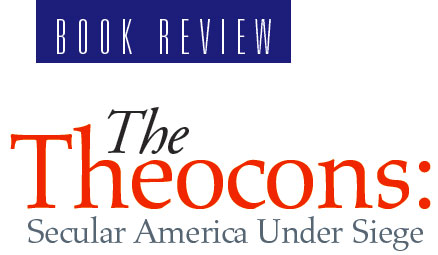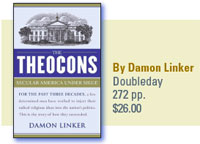The Theocons: Secular America Under Siege
Charles J. Eusey July/August 2007
Getting your Trinity Audio player ready...

The theme of this book is the rise of public religiosity that has been orchestrated by a small group of "theoconservative" intellectuals. It is Mr. Linker's contention that Roman Catholicism has provided Republicans with a nondenominational language and morality with universal appeal. He foresees the end of separation of church and state and of secular polities.
The founder of the theocon movement is Richard John Neuhaus, for whom Linker worked when he served as editor of First Things. Neuhaus, a Lutheran convert to Roman Catholicism, is joined by two other Roman Catholics, Michael Novak and George Wiegel, as the three most important theocons.
Neuhaus claims that this nation is facing a national "crisis of meaning" (i.e., a crisis of religion); and the cause of the crisis is that the governance of our nation is influenced by decadent liberals who advocate a form of "secularized liberalism cut off from its religious roots and robbed of its power to provide meaning." The future of democracy in America depends upon public religiosity. He wishes, says Linker, "to bring politics into conformity with divine authority."
Novak maintains that Christianity, modern democracy, and modern capitalism share "the same logic, the same moral principles, the same set of cultural values, institutions, and presuppositions."

Novak has contributed to the theocon philosophy by making the case for the compatibility of free markets and Christian ethics in The Spirit of Democratic Capitalism. Neuhaus maintains that Pope John Paul II accepted Novak's spiritualized view of "democratic capitalism." Democratic capitalism is an outgrowth of the Catholic doctrine of "creative subjectivity of the human person." Linker says, "a Capitalist economy dominated by a generally Catholic outlook would be one in which its members spontaneously acted to maximize their own benefits as well as the common good—the only effective means of alleviating the suffering and degradation of poverty."
The theocon ideology emphasizes economics to a degree, but places far more emphasis on its opposition to legalized abortion. Neuhaus does this by referencing innate human dignity based on man's creation in the image of God. He believes that legalized abortion could lead to infanticide and even genocide. Failure to outlaw abortion is evidence of "an extremely dangerous crisis of the moral sense, which is becoming more and more incapable of distinguishing between good and evil, even when the fundamental right to life is at stake."
In 1985 Charles W. Colson initiated discussions between Neuhaus and several prominent evangelicals. The religious alliance advocated by the theocons was to become a formal reality. From the fall of 1992 to the spring of 1994 they worked on "Evangelicals and Catholics together: The Christian Mission for the Third Millennium."
This document aims at a revitalized American democracy on the recognition that "religious freedom is itself grounded in and is a product of religious faith." Separation of church and state does not mean "separation of religion from public life." Religion is the "foundation of our legal order." Roman Catholics and evangelicals had come together in the face of "a cultural crisis of historic magnitude." Doctrinal differences would be set aside to better fight a culture war.
The next step for the theocons was to become more involved in a political agenda. Neuhaus proposed a special issue of First Things on "judicial tyranny." It was titled "The End of Democracy? The Judicial Usurpation of Politics." Neuhaus introduced the readers to the topic by stating the question was "whether we have reached or are reaching the point where conscientious citizens can no longer give moral assent to the existing regime." He went on to say, "Law, as it is presently made by the judiciary, has declared its independence from morality." What should be our attitude to "laws which violate the moral law?" They must, Neuhaus said, "in conscience be disobeyed."
Colson contributed to this edition of First Things by suggesting the possible need of "direct, extra political confrontation of the judicially controlled regime." Robert P. George agreed. He claimed, "The courts . . . have imposed upon the nation immoral policies that pro-life Americans cannot, in conscience, accept."
In response to the critics of the special issue, Neuhaus claimed, "The American experiment began with the declaration of self-evident truths, and it may well be ending with the exclusion of those truths from the public square under the iron rule of 'the separation of church and state.'"

Wiegel supported the war in Iraq in a lecture at the Catholic University School of Law entitled "Moral Clarity in a Time of War." The lecture, later republished in First Things, provided moral and theological justification for the president's Iraq policy.
Wiegel maintained that America has a duty to enforce international justice, to further the good of all decent human beings. He went on to say that statesmen are given the gift of the Holy Spirit, a charism of political discernment, in deciding whether to go to war. This gift, he said, is not shared by religious authorities or agencies.
Neuhaus sees a fundamental problem with American religion—its troubled relationship with authority. He says a Christian must "think with the church.. . . in the larger picture of history, the witness of the Catholic Church is immeasurably more important than anything I might think or say. In short, I obey."
Linker looks at the early history of America and says that religious passions do not belong in public life. The precondition of religious freedom is "privatization of piety." Americans may worship as they wish without state interference, but they are given this freedom on the condition that they give up their desire for "political rule in the name of their faith."
Reviewed by Attorney Charles J. Eusey, Leominster, Massachusetts.
The book under review presents a good explanation of just how the culture war is being carried by the theocons. While Liberty shares their concerns, we see their chosen methods as destructive to the true pluralism of the United States, dismissive of the Constitution, and clearly a growing threat to religious liberty for all. —Editor.